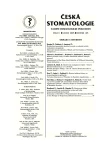-
Medical journals
- Career
Corrosion Resistance of Titanium in Dentistry Applications
Authors: T. Hora; L. Joska; E. Gojišová
Authors‘ workplace: Stomatologická klinika 3. LF UK, Praha přednostka doc. MUDr. E. Gojišová ; Ústav kovových materiálů a korozního inženýrství ; Vysoká škola chemicko-technologická, Praha vedoucí prof. Ing. P. Novák, CSc. ; Ústav biofyziky a informatiky 1. LF UK, Praha vedoucí doc. Ing. M. Špunda, CSc.
Published in: Česká stomatologie / Praktické zubní lékařství, ročník 105, 2005, 1, s. 20-25
Overview
Titanium and its alloys is used in dentistry for excellent mechanical and the physical characteristics with high corrosion resistance and it seem to be one of the most appropriate materials for dental use at all. On the contrary to precious alloys, its suitable corrosion quality is gained throughout the process of passivation, i.e. formation of thin oxide layer on the surface, separating titanium from surrounding environment. At the same time, this fact represents general risk of corrosion damage in the locations of breakdown of passive layer, so local forms of corrosion cannot be excluded under unfavorable conditions. Another well-known characteristic is instability of the passive layer in the presence of fluorides. This article summarizes the set of works dedicated to the local forms of corrosion.
Key words:
titanium – passivation – corrosion – local forms of corrosion – ion release – free corrosion potential – potentiodynamic test – polarization resistance – fluorides
Labels
Maxillofacial surgery Orthodontics Dental medicine
Article was published inCzech Dental Journal

2005 Issue 1-
All articles in this issue
- Are We Able to Take Care of Our Own Dentition? Results of Examination of Oral Hygiene in the High-School Population
- Titanium Disc Modified with Hydroxyapatite and Zirconia Does not Reveal Signs of Cytotoxicity
- Growth of the Stabilized HeLa Cell line in Chromium-Cobalt Extract of Surface – Layered Titanium Nitride and Zirconium Nitride
- Treated by Stomatology Patients in the Cooperation with Anesthesiologist
- Molecular Genetic Identity of Blood and Oral Isolates of Viridans Streptococci
- Measurement of the Shear Bond Stability of Different Generation Dental Adhesives
- Bonded Amalgam Filling – Part II: Clinical Evaluation after 7, 8 and 9 Years
- Corrosion Resistance of Titanium in Dentistry Applications
- Application of Shape-Memory Stapes in Osteosynthesis of Mandible Fracture
- Evaluation of the Effect of Propriosensitive Re-education Exercise in the Therapy of Temporomandibular Disorders
- Czech Dental Journal
- Journal archive
- Current issue
- Online only
- About the journal
Most read in this issue- Corrosion Resistance of Titanium in Dentistry Applications
- Evaluation of the Effect of Propriosensitive Re-education Exercise in the Therapy of Temporomandibular Disorders
- Bonded Amalgam Filling – Part II: Clinical Evaluation after 7, 8 and 9 Years
- Molecular Genetic Identity of Blood and Oral Isolates of Viridans Streptococci
Login#ADS_BOTTOM_SCRIPTS#Forgotten passwordEnter the email address that you registered with. We will send you instructions on how to set a new password.
- Career

